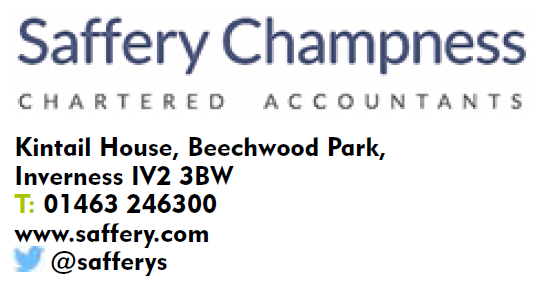Inverness based chartered accountants Saffery Champness are sharing some top tips for preparing your business’s taxes this winter.
According to their experts, if your business has a year-end over the winter months, then now’s a good time to check that your company’s tax affairs are in good shape.
As there is generally more scope for tax planning before your financial year-end, being on your front-foot with reliable up to date financial information is a must.
Although you should seek tailored advice before making any decision, here is a list from Saffery Champness covering key areas to consider before your next year-end:
1 Maximise relief for capital expenditure
For 12-month periods starting 1 January 2019, the Annual Investment Allowance (AIA) which gives 100% relief for qualifying expenditure is £1m.
In practice, every £10,000 your company invests in qualifying expenditure between now and your year-end will reduce your corporation tax bill by £1,900.
2 Defer taxable profits
In some instances, it may be appropriate to delay income or accelerate expenditure by a few weeks or days. This can have the effect of shifting the profit forward into the next financial year and thus delays the payment of the related corporation tax liability by 12 months.
This is not an area to be messed with. All your company’s transactions must be accounted for and assessed for tax purposes correctly.
Professional advice should be taken before considering the timing of the recognition of income and expenditure.
3 Pension payments
As employer pension contributions are tax deductible in the year in which they are paid, you should ensure pension contributions are paid before your year-end.
As employees or directors are not taxed personally on employer pension contributions it is a very tax-efficient way to reward your team.
Again, as with many areas of tax, the rules relating to pension contributions are complicated and professional advice should be taken before making substantial contributions.
4 Research & development
Companies are entitled to claim R&D tax reliefs in the year in which the R&D expenditure is incurred, provided certain conditions are met. Reliefs are available to profitable and to loss making companies. This could result in HMRC giving you money!
“Don’t assume that because your staff don’t wear white coats and work in a lab that your company will not be eligible for this relief. It is worth checking it out,” says Donald Forsyth, Partner at Saffery Champness.
5 Charitable donations
Charitable donations are tax deductible in the year in which they are paid. If your company makes charitable donations such that the business makes a loss, the excess donation cannot be carried forward to reduce your corporation tax liability in future years.
6 Dividends
You may wish to declare a dividend or make a bonus payment before the year-end. The tax implications for the recipient and effect on the company’s cash position should be considered as part of the decision-making process.
Payment of a bonus will have an impact on the company’s corporation tax bill, a dividend will not.
7 Clear overdrawn directors’ loan accounts
If directors’ loan accounts (DLAs) are overdrawn at the end of the year, ensure that they are repaid within nine months of the year-end.
If not, the company will be liable to pay a tax charge amounting to 32.5% of the overdrawn balance (a lower rate of tax applies to overdrawn DLAs that are pre- 6 April 2016).
Although this tax charge will be refunded by HMRC when the DLA is cleared, it takes time and, as such, overdrawn DLAs are generally best avoided.
8 Interest on shareholder loans
As a shareholder or director, you may be in the position where the company owes you money.
If the company pays you interest on these balances it must be paid within 12 months of the year-end to be eligible for a tax deduction in the current financial year.
9 Claim loss relief as early as possible
If you are anticipating making a tax loss, the corporation tax return with a loss carry back claim should be filed as early as possible to obtain an early refund.
This will require you to have your annual accounts signed-off as they form part of your corporation tax return.
Being on top of your regular management accounts, up to date with your finances and ready for the accountants/auditors will be a must.
10 Rollover relief
Corporation tax on capital gains arising on the disposal of land, buildings and fixed plant (qualifying trading assets) may be deferred if the disposal proceeds are reinvested in further qualifying trading assets.
The proceeds must be reinvested in the 12 months preceding or in the 36 months following the disposal.
Companies should consider advancing or delaying planned capital expenditure where possible to fall within these time limits thereby enabling the deferral of corporation tax on these gains.
For an informal discussion on tax planning, re-structuring or improving your financial information, contact Donald Forsyth at Saffery Champness LLP, Inverness.



